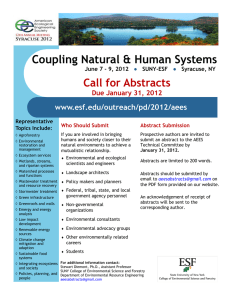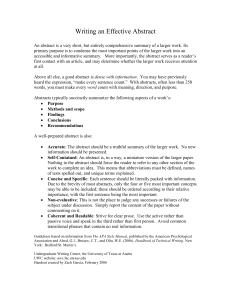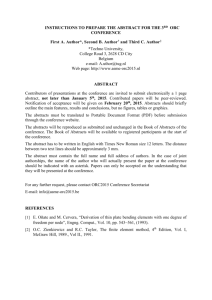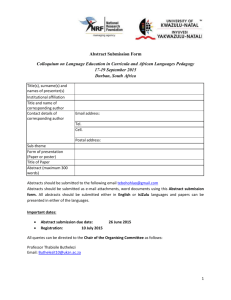Chapter Abstracts
advertisement
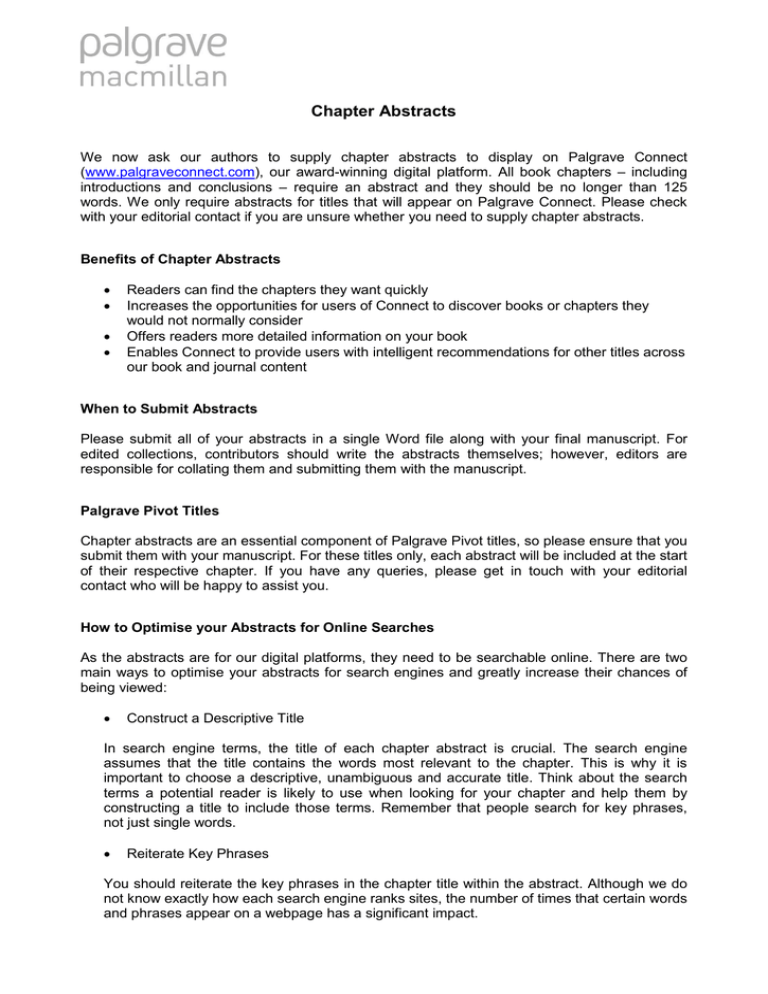
Chapter Abstracts We now ask our authors to supply chapter abstracts to display on Palgrave Connect (www.palgraveconnect.com), our award-winning digital platform. All book chapters – including introductions and conclusions – require an abstract and they should be no longer than 125 words. We only require abstracts for titles that will appear on Palgrave Connect. Please check with your editorial contact if you are unsure whether you need to supply chapter abstracts. Benefits of Chapter Abstracts Readers can find the chapters they want quickly Increases the opportunities for users of Connect to discover books or chapters they would not normally consider Offers readers more detailed information on your book Enables Connect to provide users with intelligent recommendations for other titles across our book and journal content When to Submit Abstracts Please submit all of your abstracts in a single Word file along with your final manuscript. For edited collections, contributors should write the abstracts themselves; however, editors are responsible for collating them and submitting them with the manuscript. Palgrave Pivot Titles Chapter abstracts are an essential component of Palgrave Pivot titles, so please ensure that you submit them with your manuscript. For these titles only, each abstract will be included at the start of their respective chapter. If you have any queries, please get in touch with your editorial contact who will be happy to assist you. How to Optimise your Abstracts for Online Searches As the abstracts are for our digital platforms, they need to be searchable online. There are two main ways to optimise your abstracts for search engines and greatly increase their chances of being viewed: Construct a Descriptive Title In search engine terms, the title of each chapter abstract is crucial. The search engine assumes that the title contains the words most relevant to the chapter. This is why it is important to choose a descriptive, unambiguous and accurate title. Think about the search terms a potential reader is likely to use when looking for your chapter and help them by constructing a title to include those terms. Remember that people search for key phrases, not just single words. Reiterate Key Phrases You should reiterate the key phrases in the chapter title within the abstract. Although we do not know exactly how each search engine ranks sites, the number of times that certain words and phrases appear on a webpage has a significant impact. How to Optimise your Abstracts: What to Do and What Not to Do Do: Construct a simple, descriptive and accurate title, containing all the important key terms and phrases that relate to the topic Repeat key phrases and incorporate them smoothly – remember that the primary audience is a potential reader and not a search engine Use synonyms or related key phrases Provide a clear and concise summary of the content of the chapter Write in the third-person present tense Example of a strong abstract: ‘The History of Digital Distribution’ by David Taylor Taylor offers a much-needed summary of the relationship between digital media markets and the methods of illicit hacker communities. Focusing on BitTorrent, the chapter also draws attention to the crucial intervention of the conflict in the history of digital distribution and uses a broad perspective to facilitate a better understanding of its roots. As well as looking at the ways in which the history was constructed, Taylor explores the methodological implications of online documents in research. ‘The History of Digital Distribution’ concludes with a case study of Pirate Bay, analysing the site as a hub for the politicisation of piracy. Do not: Construct an ambiguous and elaborate title Provide general facts – be sure to focus on the core discussions/findings Write in the first person Write in the past or future tense Use overly technical language Example of a weak abstract: ‘Pirates on the High C++’ by David Taylor In Chapter 1 I looked at the ways in which the history of distribution was constructed. I explored the implications of using digital documents in research. With the advancement of network bandwidth capabilities, digital technology became prominent in the 2000s. It has replaced conventional physical distribution such as paper and DVDs. By opting for this method, a producer can get their work into the public sphere of interest easily with potentially minimum business overhead. This often leads to cheaper goods for the consumer and increased profits for the producer. For example, unsigned music acts are able to access the same distribution channels as major record labels, with none of the restrictive practices or inflated manufacturing costs. I will also discuss Pirate Bay as a hub for the politicisation of piracy.

